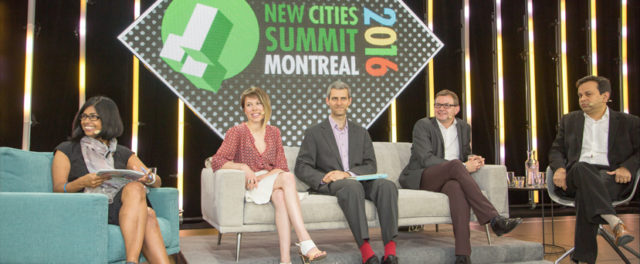
Inclusive Urban Tech
August 17, 2016 — Blog
This post is part of our Age of Urban Tech discussion series, following the fifth edition of the New Cities Summit in Montréal in June 2016.
“Technology is no longer a question of just who can take part, it is also who wants to take part,” said Jenviev Azzolin on the topic of Inclusive Urban Tech. She explained how her crowdsourcing platform, WeHost, allows ordinary citizens to link their spare rooms and unused spaces with refugees who are in dire need of housing. While governments around the world, including in Azzolin’s native Canada, are demonstrating a strong willingness to welcome refugees, the lack of affordable housing forces them to limit numbers. WeHost uses a bottom-up solution to help address this encumbrance, enabling anyone to become involved in the process of helping refugees. The platform also facilitates cross-cultural connections intended to create enriched and stronger societies.
“If you trust in the people, the people will step up,” said Josh Lerner, who suggested using Urban Tech to empower everyday citizens in the policymaking process as a step toward democratic renewal. His platform, the Participatory Budgeting Project, adapted from a tool implemented in Brazil, allows any citizen to crowd-input which projects they want their city to fund. The most popular projects are passed up to policymakers and experts who refine the proposal, then return the plan to citizens for a vote. If passed, the project will go ahead. Lerner maintains the Participatory Budgeting Project constitutes inclusive Urban Tech because it empowers those with the least power and the greatest needs by giving them an equal say and influence.
Asif Saleh believes Urban Tech can be used to meet the challenge of poverty by addressing its underlying causes. Based in Bangladesh, BRAC has pursued three innovations to directly fight poverty. The first is financial inclusion; BRAC started a mobile financial service enabling migrant workers, particularly the semi-literate, to move money from their places of work to their homes, often in rural areas. Second, access to information; BRAC created “Maya,” a hotline, app and website designed to provide basic healthcare information to women who may not be comfortable discussing it in their social circles. Third, accountability for local government; BRAC created a new app to encourage city dwellers to report potholes or any other failing infrastructure.
Steven Ramage’s platform, what3words, a Global Urban Innovator, offers an incredibly inclusive technological option for those with or without technological knowhow or access. The startup has broken the entire world into 3×3 meter squares, applying a three word address to every grid, offering everyone on Earth an address.

Speakers
Jenviev Azzolin, President and Co-Founder, PPLCONNECT & WeHost
Josh Lerner, Co-founder and Executive Director, The Participatory Budgeting Project
Steven Ramage, Strategy Director, what3words
Asif Saleh, Senior Director, Strategy, Communication and Empowerment, BRAC International
Moderator: Dilki de Silva, Secretary General, International Council of Societies of Industrial Design
